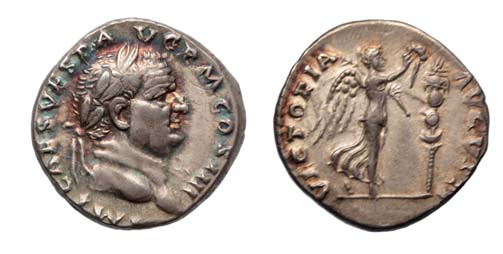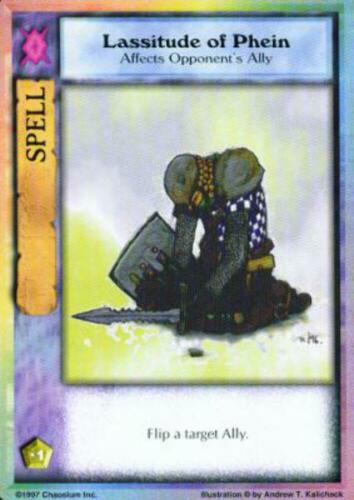Additional References: BMC 74
Notes: Laureate head of Vespasian to right / Victory standing to right and pacing a wreath on a military trophy.
Obverse: Vespasian (Latin: Titus Flāvius Caesar Vespasiānus Augustus; 17 November 9 – 23 June 79) was Roman Emperor from AD 69 to AD 79. Vespasian founded the Flavian dynasty that ruled the Empire for twenty-seven years. Vespasian was from an equestrian family that rose into the senatorial rank under the Julio–Claudian emperors. Although he fulfilled the standard succession of public offices and held the consulship in AD 51, Vespasian’s renown came from his military success: he was legate of Legio II Augusta during the Roman invasion of Britain in 43 and subjugated Judaea during the Jewish rebellion of 66.
While Vespasian besieged Jerusalem during the Jewish rebellion, emperor Nero committed suicide and plunged Rome into a year of civil war known as the Year of the Four Emperors. After Galba and Otho perished in quick succession, Vitellius became the third emperor in April 69. The Roman legions of Roman Egypt and Judaea reacted by declaring Vespasian, their commander, emperor on 1 July 69. In his bid for imperial power, Vespasian joined forces with Mucianus, the governor of Syria, and Primus, a general in Pannonia, leaving his son Titus to command the besieging forces at Jerusalem. Primus and Mucianus led the Flavian forces against Vitellius, while Vespasian took control of Egypt. On 20 December 69, Vitellius was defeated, and the following day Vespasian was declared Emperor by the Roman Senate. Vespasian dated his tribunician years from 1 July, substituting the acts of Rome’s senate and people as the legal basis for his appointment with the declaration of his legions, and transforming his legions into an electoral college.
Little information survives about the government during Vespasian’s ten-year rule. He reformed the financial system at Rome after the campaign against Judaea ended successfully, and initiated several ambitious construction projects. He built the Flavian Amphitheatre, better known today as the Roman Colosseum. In reaction to the events of 68–69, Vespasian forced through an improvement in army discipline. Through his general Agricola, Vespasian increased imperial expansion in Britain. After his death in 79, he was succeeded by his eldest son Titus, thus becoming the first Roman Emperor to be directly succeeded by his own natural son and establishing the Flavian dynasty
While Vespasian besieged Jerusalem during the Jewish rebellion, emperor Nero committed suicide and plunged Rome into a year of civil war known as the Year of the Four Emperors. After Galba and Otho perished in quick succession, Vitellius became the third emperor in April 69. The Roman legions of Roman Egypt and Judaea reacted by declaring Vespasian, their commander, emperor on 1 July 69. In his bid for imperial power, Vespasian joined forces with Mucianus, the governor of Syria, and Primus, a general in Pannonia, leaving his son Titus to command the besieging forces at Jerusalem. Primus and Mucianus led the Flavian forces against Vitellius, while Vespasian took control of Egypt. On 20 December 69, Vitellius was defeated, and the following day Vespasian was declared Emperor by the Roman Senate. Vespasian dated his tribunician years from 1 July, substituting the acts of Rome’s senate and people as the legal basis for his appointment with the declaration of his legions, and transforming his legions into an electoral college.
Little information survives about the government during Vespasian’s ten-year rule. He reformed the financial system at Rome after the campaign against Judaea ended successfully, and initiated several ambitious construction projects. He built the Flavian Amphitheatre, better known today as the Roman Colosseum. In reaction to the events of 68–69, Vespasian forced through an improvement in army discipline. Through his general Agricola, Vespasian increased imperial expansion in Britain. After his death in 79, he was succeeded by his eldest son Titus, thus becoming the first Roman Emperor to be directly succeeded by his own natural son and establishing the Flavian dynasty
Denomination: In the Roman currency system, the denarius was a small silver coin first minted about 211 BC during the Second Punic War. It became the most common coin produced for circulation but was slowly debased in weight and silver content until its replacement by the double denarius, called the antoninianus, early in the 3rd century AD. The word denarius is derived from the Latin dēnī "containing ten", as its value was 10 asses, although in the middle of the 2nd century BC it was recalibrated so that it was now worth sixteen asses or four sestertii. It is the origin of several modern words such as the currency name dinar; it is also the origin for the common noun for money in Italian denaro, in Portuguese dinheiro and in Spanish dinero.
From Wikipedia
From Wikipedia
Period: Imperial Rome. As the Roman Republic began to implode because of
corruption and infighting among powerful members of the Roman Senate, a new type of
Roman Republican coinage emerges, that of the military strongmen who dominated and
fought among each other before the final fall of the Republic. The drama surrounding
the fall of the Roman Republic is a story full of political intrigue, military action, betrayal,
murder and sex scandals. Different parts of this story have been told and retold by
ancient historians, modern day scholars, dozens of Hollywood movies and even an HBO
miniseries. All of the actors in this great drama, Crassus, Pompey, Julius Caesar, Brutus
and Cassius, Mark Antony and Cleopatra and the last man standing at the end of it all,
Octavian (later known as the first emperor of Rome, Emperor Augustus) all minted coins
during this time bearing their names and propaganda images supporting their factions
and political ideals.
Culture: Ancient Rome. A famous catch phrase "Rome was not built in a day"
definitely applies to the Roman civilization. Rome stated as a series of small villages among the
famous seven hills of Rome along the river Tiber. Eventually through conquest, diplomacy, wise
policies of indirect rule and assimilation, the Romans were able to not only unify the Italian
peninsula, but though a series of brutal wars against regional powers established a great Empire
that spanned Europe, Asia and Africa, making the Mediterrean Sea and "Roman Lake."
All Roman coinage can generally be divided into eight time periods as described below. An interesting thing about Roman coins minted during these eight time periods is that you can literally see the "Rise and Fall" of the Roman Empire on its coinage as the sharp imagery and pure silver and gold coins of the Roman Republic and Early Imperial Period gradually devolves into crude, illegible and heavily debased coins of the "Barracks Emperors" and "Barbarian" Period.
All Roman coinage can generally be divided into eight time periods as described below. An interesting thing about Roman coins minted during these eight time periods is that you can literally see the "Rise and Fall" of the Roman Empire on its coinage as the sharp imagery and pure silver and gold coins of the Roman Republic and Early Imperial Period gradually devolves into crude, illegible and heavily debased coins of the "Barracks Emperors" and "Barbarian" Period.
Item created by: gdm on 2016-08-14 11:44:34. Last edited by gdm on 2016-08-14 16:34:43
If you see errors or missing data in this entry, please feel free to log in and edit it. Anyone with a Gmail account can log in instantly.
If you see errors or missing data in this entry, please feel free to log in and edit it. Anyone with a Gmail account can log in instantly.







